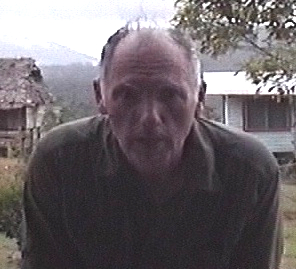I’ve gotten some distinguished attention over the past few years, much of it negative reactions to my writings about the ropen or living pterosaurs in general, much of it including some degree of negative mentioning of my religious beliefs. In recent months, the attention has changed: It’s gotten worse and from a more distinguished paleontologist than I had imagined would take such notice of my writings. The critical point of difference is this: The honesty and integrity of Jonathan Whitcomb, unfortunately, is now the subject, more than the credibility of a species of modern pterosaur.
Have I been honest or dishonest?
For those who know much about my work in cryptozoology over the past eleven years, this may sound strange. I have written more about the possibility of living pterosaurs in this modern world of ours than any other writer: well over a thousand blog posts and web pages, and I mean original articles, not copy-and-paste duplications. During all those years of attempts to convince people of extant pterosaurs, I admitted that I had never seen anything like a living pterosaur myself, not after my expedition to a remote island in the southwest Pacific and not after I had examined many thousands of game-camera photos at a sighting location. Does that sound like I was being dishonest?
The most prominent attack appears to come from a well-known American paleontologist, Donald Prothero, and the page in question, easily found through a Google search on “Jonathan Whitcomb” states the following:
Donald Prothero considers the marginal story of the “ropen”—an allegedly pterosaur-like cryptid—and the man who has led a one-man crusade to promote it using an army of sock-puppets.
What is this “army of sock-puppets?” Only the following two pen names:
- Norman Huntington
- Nathaniel Coleman
Yes, my “army” consisted of those two names. And I continue to proclaim that the use of those two pseudonyms was completely justified and used to declare the truth.
What about my “one-man” crusade? Who were the persons involved in this? I will mention some of the names, the official names, of those men who participated in searching in Papua New Guinea for living pterosaurs. None of the following are pen names; they represent nine distinct persons.
- Paul Nation
- Carl Baugh
- James Blume
- Nathanael Nation
- David Woetzel
- Garth Guessman
- Jacob Kepas
- Luke Paina
- Jonathan Whitcomb
Dr. Prothero mentions none of the above names in his post “Fake Pterosaurs and Sock Puppets,” except my name. Keep in mind, the above names are only a partial list of explorers who have searched for living pterosaurs in tropical wilderness areas of Papua New Guinea, and almost all of the above men did so with religious ideals, with confidence in the truth found in the Bible. Does not that sound like participants in a “crusade?” Why does the page-redirect for Prothero’s post call this a “one-man” crusade?
Television Productions
Prothero does mention the television shows Destination Truth and Monsterquest, referring to the expeditions in Papua New Guinea that related to potential modern pterosaurs. Yet he gives me too much credit, declaring that those two TV episodes were “all unwittingly based on the obsessions of one individual.” What a strange declaration!
Why would he think that those two television episodes were “all” based on just my writings? Keep in mind that many of my online and book publications were written after those two episodes of Destination Truth and Monsterquest were aired. Indeed, many of my writings have been about those two episodes and how they relate to expeditions of many other explorers who were searching for modern pterosaurs. How strange for a celebrated scientist to overlook so many critical details!
I did consult with both production teams before they traveled to Papua New Guinea, but Destination Truth went to Papua New Guinea with knowledge of the 2006 expedition of Paul Nation and Monsterquest went there with Garth Guessman himself among the crew.
Dr. Prothero is not alone in this obsession that I must have been dishonest, but I am also not alone in searching for the truth about reports of living pterosaurs.
“Sock puppets” or proper use of two pseudonyms
My use of two pen names allowed eyewitness reports to be read by those who might not otherwise have paid attention to them, persons like Dr. Donald Prothero himself. I stand by my proper desires to disseminate those eyewitness testimonies.
In the first few years after my 2004 expedition on Umboi Island, Papua New Guinea, critics concentrated on ridiculing the possibility of any extant pterosaur, with limited libel against me. Accusations that I had been dishonest, however, were enough to justify my temporary use of two pen names, so that the reports themselves might become better known (without my regular name causing a distraction).
I do not accuse Prothero of dishonesty in spreading falsehoods about me; he has followed other careless writers of libel. But I am surprised that one with so many credentials in science would write so much in one post with not one mention of the word fossil and nothing scientific. I thought that a scientist who had written dozens of books and scientific papers would be able to write one scientific sentence in a blog post.
This paleontologist did think it worth his while to continue using bulverism by writing about my religious beliefs. Yes, it is strange, but while avoiding writing anything scientific in his post he did manage to write about my religious beliefs, or rather his opinion: what he believes I believe.
I am happy to allow the truth to come out in the end. A modern pterosaur will eventually be officially discovered. If paleontologists then will continue to accuse me of being dishonest, I will then feel sorry for their foolishness.
###
.
This past summer, I wrote about a biology professor in Minnesota who criticized me for what he declared were my bad motivations. His post was not like a scientific article, not even slightly like a peer-reviewed paper in a journal of science; it appeared more like a dirty political attack.
Paul Nation, Jonathan Whitcomb, Garth Guessman, and David Woetzel
From 1994 through early 2007, a few American creationist cryptozoologists have explored remote areas of Papua New Guinea, searching for a flying creature called “ropen” on Umboi Island.
Honesty in Searching for a Ropen
“stupid dinosaur lies” – Those are not my words. They are part of a URL that I first saw [years ago] . . . perhaps the first major online attack against those who promote the possibility that not all of these featherless flying creatures are extinct.
Many news releases on living pterosaurs or “pterodactyls”
I applaud writers for pointing out the problem of people mistaking Frigate birds for what they thought were modern pterosaurs or “dinosaur birds.” Mr. Switek was correct in pointing out that error, that embarrassing error, in Aym’s newspaper article. But the blog post written four days later, by Switek, (“Don’t Get Strung Along by the ‘Ropen’ Myth”) is also full of error, not the same kind of glaring blunder as in the newspaper article but still serious error.
Jonathan Whitcomb and Sock Puppets
Soon after my expedition on Umboi Island, in 2004, I found a web site highly critical of the living pterosaur investigations. In fact, the URL included the words stupid, dinosaur, and lies. In the original posting, both my first and last names were misspelled: “John Whittcomb.” . . .
Insinuations and direct statements about dishonesty followed. It came to the point where one skeptic suggested people should take statements by Paul Nation with a “grain of salt” because he was associated with Jonathan Whitcomb. . . .
To publicize details about the encounters with apparent pterosaurs, I needed some way to emphasize those reports without my name getting in the way. I began using two pseudonyms on a limited number of my many blogs: Nathaniel Coleman and Norman Huntington.
.



